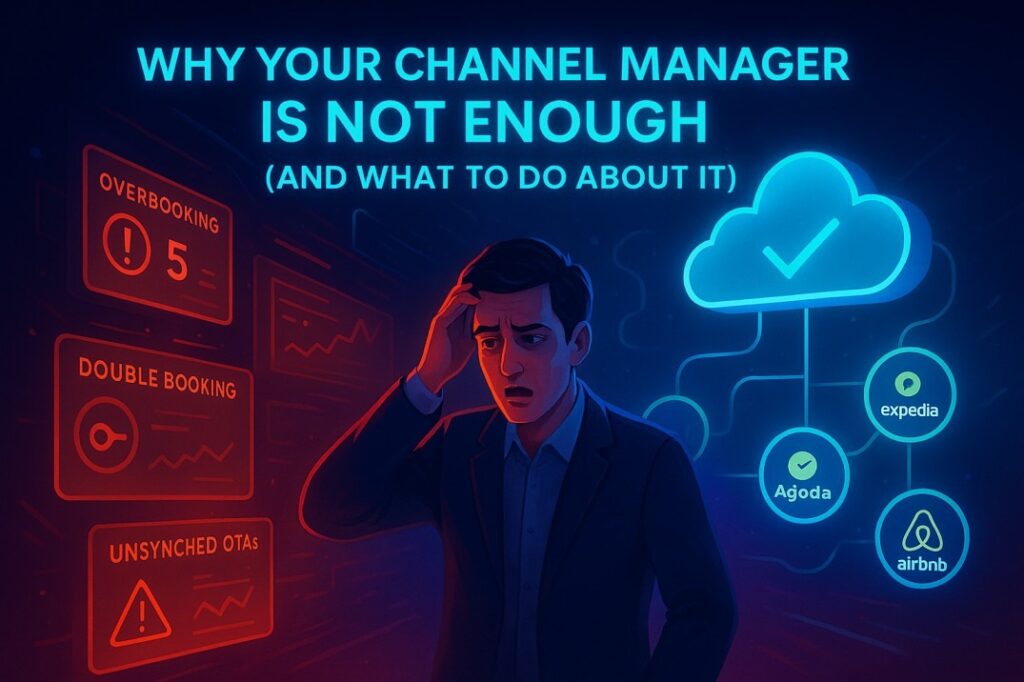A channel manager has become an essential tool for hoteliers today, enabling the automation of room distribution across multiple OTAs and booking platforms. It helps you stay competitive, avoid overbookings, and increase your property’s visibility. But while a channel manager is necessary, it is not enough to run a modern, high-performing hotel.
To thrive in the increasingly digital and guest-centric hospitality industry, hoteliers need a more integrated, intelligent, and flexible solution. Relying solely on a channel manager limits your operational capabilities and can even result in lost revenue and poor guest experiences.

In this article, we’ll explore why your channel manager might be falling short, what essential tools and integrations it’s missing, and what you can do to build a tech stack that actually drives business growth.
What Does a Channel Manager Do Well?
Before we dive into the limitations, let’s briefly acknowledge the strengths of a channel manager:
- Real-time inventory and rate updates across OTAs
- Avoidance of overbooking through two-way synchronization
- Increased reach by connecting to multiple booking platforms
- Centralized control over pricing and availability
These are critical capabilities. But they only solve one piece of the puzzle. Hotel operations, guest engagement, and revenue management involve far more moving parts than OTA distribution.
The Problem: A Channel Manager is Not a Complete Hotel Management System
Here’s the truth: a channel manager is not designed to handle the full scope of your hotel’s operations.
While it handles external distribution well, it falls short in managing internal operations, guest experience, analytics, and profitability optimization. Below are the key limitations of relying solely on a channel manager.
1. No Operational Control Inside the Hotel
A channel manager is focused on external platforms. It does not manage what happens inside your hotel:
- Front desk operations
- Housekeeping coordination
- Check-in/check-out processes
- Guest communications
- Billing and payments
Without integration with a Property Management System (PMS), you’re forced to manage these functions manually or across multiple disconnected tools.
2. Lack of Automation in Guest Experience
Modern guests expect a seamless, tech-enabled experience:
- Mobile check-in/check-out
- Pre-arrival messages
- Automated upselling of services
- Feedback collection
A channel manager doesn’t handle any of this. Without a guest experience platform, you risk falling behind competitors who offer convenience and personalization at every touchpoint.
3. No Direct Booking Strategy
While channel managers increase OTA visibility, they don’t help you reduce dependency on them. High OTA commissions eat into your revenue.
To build a direct booking channel, you need:
- A conversion-optimized booking engine
- Dynamic pricing and rate parity controls
- Website integration
- Promotional tools and loyalty programs
These features are outside the scope of a traditional channel manager.
4. Limited or No Revenue Management Capabilities
Optimizing room pricing dynamically based on demand, seasonality, and competition is essential. A standalone channel manager can’t help you:
- Analyze real-time market data
- Forecast demand
- Apply revenue rules automatically
- Adjust rates for maximum yield
This requires integration with a revenue management system (RMS) or a smart pricing engine.
5. Fragmented Reporting and Analytics
Channel managers typically provide only basic booking and inventory data. They don’t offer:
- Profitability reports
- Guest behavior insights
- Operational KPIs
- Multi-department analytics
Making data-driven decisions becomes difficult without a centralized reporting system that pulls data from all hotel departments.
6. Poor Integration With Other Hotel Tech
Your hotel likely uses (or should use) other systems such as:
- PMS (Property Management System)
- POS (Point of Sale for restaurant or spa)
- CRM (Customer Relationship Management)
- Housekeeping apps
- Feedback and reputation tools
A channel manager often lacks deep, seamless integrations with these systems. As a result, you deal with:
- Manual data entry
- Staff confusion
- Increased human errors
- Slower response times
7. No Control Over the Guest Journey
From discovery to post-stay, the guest journey includes multiple phases:
- Pre-booking (inspiration and research)
- Booking (channel selection and conversion)
- Pre-arrival (welcome messaging and upsells)
- Stay (service delivery and personalization)
- Post-stay (reviews and loyalty)
A channel manager only touches the booking phase—leaving the rest to chance or to disconnected tools.
So, What’s the Solution?
To compete effectively in today’s hospitality environment, you need more than a channel manager. You need a fully integrated hotel management platform that centralizes operations, automates processes, and delivers an outstanding guest experience.
Here’s what to look for:
1. A Cloud-Based Property Management System (PMS)
A modern PMS does far more than manage rooms. It acts as the core operational hub of your property. With the right PMS, you can:
- Manage front desk and reservations
- Automate check-in and check-out
- Coordinate housekeeping and maintenance
- Store guest data and history
- Handle payments and folios
- Sync with your channel manager seamlessly
When your PMS and channel manager are integrated, inventory and reservations flow smoothly in both directions—giving you real-time control over both external and internal operations.
2. A Direct Booking Engine
To reduce OTA dependence and increase profit per booking, you need to drive more reservations through your own website.
Your direct booking engine should:
- Offer real-time availability and pricing
- Support promotions, discount codes, and upsells
- Be mobile-friendly and conversion-optimized
- Integrate with your PMS and channel manager
With this in place, you can grow your direct revenue without increasing marketing spend.
3. Revenue Management Tools
Whether built-in or integrated, smart pricing tools can dramatically increase your room revenue.
Look for tools that can:
- Analyze booking pace and demand trends
- Monitor competitor pricing
- Automate rate changes
- Suggest or implement yield strategies
With real-time rate optimization, you can sell the right room at the right price every time.
4. Guest Experience Automation
Automated guest communication improves satisfaction and reduces workload. You can use tools that:
- Send pre-arrival emails or SMS
- Offer room upgrades or add-ons
- Enable mobile check-in/out
- Request reviews after departure
Automation helps you personalize the guest journey at scale and build stronger guest relationships.
5. Centralized Reporting and Analytics
You need more than a daily revenue report. A complete system gives you:
- Guest insights (lifetime value, booking channels, stay patterns)
- Channel performance analytics
- Revenue vs. cost breakdowns
- Operational KPIs (turnover, housekeeping, occupancy)
- Multi-property reporting (if applicable)
These insights allow you to make informed decisions and grow strategically.
6. Seamless Integrations and Open APIs
Your hotel technology should work together, not in silos. Choose a platform that offers:
- Deep integrations with popular hospitality tools
- API access for customization
- Marketplace or add-on modules
With a flexible, connected ecosystem, you can add tools as your needs grow—without replacing your core systems.
The SaasAro Approach: Beyond Just Channel Management
At SaasAro, we understand that a channel manager alone isn’t enough. That’s why we offer an integrated cloud-based hotel management platform that combines:
- A powerful channel manager
- Smart booking engine
- Property management system
- Revenue optimization tools
- Guest engagement features
- Centralized analytics
- Seamless integrations
Everything works together in a single dashboard—helping you manage your property efficiently, delight your guests, and increase revenue.
Conclusion
While a channel manager is a crucial component of modern hotel operations, it cannot function as a standalone solution. The hospitality landscape is evolving fast, and guests expect a seamless, tech-enabled experience from start to finish.
To truly thrive, you need an integrated platform that connects your distribution channels with your internal operations, guest communication, revenue strategy, and performance analytics.
Don’t settle for tools that only solve part of the problem. Upgrade to a smarter, more connected hotel management ecosystem—and future-proof your business.


